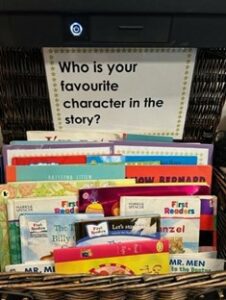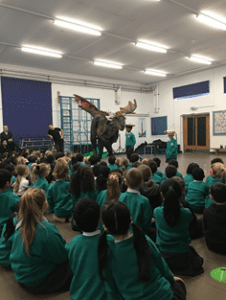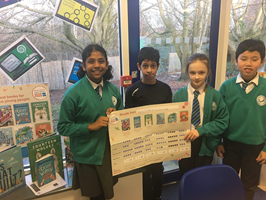English
English at Broadheath
“Reading is like breathing in and writing is like breathing out”
Pam Allen
Our Intent in English
All areas of the curriculum involve using English for communicating with others around us and it is embedded across the curriculum. It is our aim to enable all of our pupil
s to develop the use and understanding of Standard English to their full potential in all aspects of speaking, listening, reading and writing, including spelling and handwriting. Our ‘believe-practice-succeed’ ethos ensures that pupils leave Broadheath Primary School with the skills they need to continue on their learning journey.
How we implement our English curriculum
At Broadheath Primary we teach English daily as a discrete subject from Nursery to Year 6, following the objectives within EYFS and National Curriculum. Through a number of adaptive practices, we ensure our English curriculum is matched to the needs and ability of all individual pupils.
Communication and language is one of the prime areas of the EYFS curriculum. Within this area pupils are taught to develop their listening, understanding and speaking skills within a broadly play based curriculum. In Nursery and Reception, these skills are at its core and reflected in all areas of provision.
English skills are also taught and embedded across the curriculum in Key Stage 1 and Key Stage 2. Within other subject areas such as Science, History and Geography we develop Disciplinary Literacy skills, so that the children can read, write and think in a way that is relevant to the subject, such as reading like a scientist or writing like a historian.
Reading
“You know you’ve read a good book when you turn the last page and feel a little as if you have lost a friend”
Paul Sweeney
Our English curriculum is based upon high quality books and real-life experiences that reflect the diversity and interests of our children. Reading activities including individual, group and guided sessions, are used to develop pupils’ reading skills that are further enhanced across the curriculum. These activities encourage the children to think about a wide range of topics and themes, exploring and delving deeply into the heart of the books. We understand the importance of phonics as a foundation for the teaching of reading. The Little Wandle scheme is used from Nursery up to Year 1 to provide a consistent and high-quality approach to teaching and learning. Reading for Pleasure is of high importance at Broadheath Primary School and is promoted through staff’s knowledge of children’s literature, book fairs and reading events.
Writing
“There is something delicious about writing the first words of a story. You never quite know where they’ll take you.”
Beatrix Potter
Engaging writing opportunities with a clear purpose and audience are developed from the children’s reading. Pupils are supported in this process, through teacher modelling, discussion and shared writing. Children work in pairs, groups or individually to write a wide range of narrative and non-narrative texts, both within discreet English lessons and as cross-curricular work. Children regularly share their writing with their peers and other year groups to make their writing meaningful. Grammar and punctuation is embedded within this planning, so that the children can apply their skills independently.
Speaking and listening
“Speak in such a way that others love to listen to you. Listen in such a way that others love to speak to you”
Anonymous
Speaking and listening activities also take place across the curriculum. Pupils have opportunities to work in groups of different sizes – in pairs, small groups, and as a whole class. Pupils learn how to take turns and when and how to participate constructively in conversation with others. Opportunities such as Talk Tuesday assemblies, Reader’s Theatre and Poetry by Heart competitions enable the children to develop these skills. Within the lessons, children will be given opportunities to perform poems, plays, make formal presentations, participate in discussions and debates and are encouraged to explain their ideas and thinking.
The Impact of our English curriculum
The impact of our English curriculum is a community of enthusiastic readers and writers, who enjoy showcasing their developing English knowledge and skills. Children are confident when encountering new vocabulary in their reading, and including it in their writing. Pupils support one another in their discussions and peer-review each other’s work, and are able to use the correct terminology when doing so, leading to productive conversations. Children write successfully across a range of forms and adapt their writing considering the purpose and audience. We hope that as children move on from us to further their learning that their creativity, passion for English and high aspirations travel with them and continue to grow and develop as they do.
Cultural Capital
Pupils are immersed in a language rich curriculum providing them with the ability to be confident global citizens. In order to develop their communication skills and enthuse and stimulate their imaginations, we offer our pupils experiences outside of the classroom, such as dragon visits, international poetry competitions , visits from poets and whole school writing experiences. Our themes and topics immerse them in the world around them, including the use of diverse reading materials which allow our pupils to consider other cultures as well as those that are familiar to them. The cultural diversity of our school is reflected in the books that are shared with the children; ensuring that all children’s experiences are valued.



